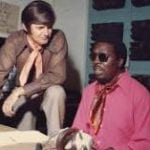Rick Bass’s novel Nashville Chrome, the Browns, and the magic of creativity
Perhaps, like me, you are given to roaming the aisles of your local independent bookstore and stumbled upon Nashville Chrome, the latest novel by Rick Bass which is both about and not at all about The Browns. The cover looks right, a painting of the trio executed by Austin illustrator Marc Burkhardt whose flat, colorful, neo-folk work has graced albums by June Carter Cash, Charlie Haden, and Houston Marchman.
Since my local independent bookstore happens to be a family business, and my wife and in-laws have given me unfettered license to climb the stairs in the back office and ransack the shelves of advance readers copies, I swiped the book (and if Mr. Burkhardt didn’t create the cover I apologize; I’m working from that advance). I couldn’t tell you why, exactly, as the Browns are principally known to me for their 1959 #1 hit reworking the Edith Piaf song “The Three Bells,” and for Jim Ed Brown’s 1967 hit, “Pop A Top.” One an annoyance, the other a pleasant footnote.
Mr. Bass proves a formidable and enticing writer, both a joy and a frustration to read, for he, too, is entranced by the magic of music. (The frustration, it should be noted, is purely mine, for he has found better words with which to express that magic than I have, despite many years trying.)
A sample, from the Prologue:
“The children, before they knew their calling, sat at the edge of the creek next to one such clearing and watched the slow muddy waters of Poplar Creek drift past. The nearest town, Sparkman, was eight miles away. To them the world was still beautiful, and only beautiful. They sat their quietly, in the last free days before they became aware that they had a gift — not a gift they had asked for or labored toward, but which had been impressed on them from birth — and they waited.”
This is a curious project, Mr. Bass has taken on. The Browns are still living and what he has written is not a history. His disclaimer opens the acknowledgments at the conclusion of the book: “I’m grateful to the Browns — Maxine, Jim Ed, and Bonnie, as well as their extremely close and extended family, past and present — for their generosity of time over the last five years — and I continue to be astounded by the living storehouse of their knowledge and experiences from the old days, and greatly appreciate their support in this venture, particularly given the novelist’s mandate (as with a musician’s) to occasionally temper certain highs while also adjusting or recasting certain lows; attenuating some things, creating others, and removing still others. Every novel that ever gets written carries a disclaimer of the imagination, and this one is no different. The Browns are real, and what they gave to American music, and how they did it, is real; Nashville Chrome, however, is a work of the imagination. For true-life details, facts, precise dates and events, see Maxine Brown’s Looking Back to See.”
It is my hunch that this novel is not really about The Browns at all, particularly having spent some time with a recently acquired copy of their Complete Hits, 21 songs in all. Mr. Bass makes of the Browns’ family harmony a kind of lodestone for the popular music of the second half of the twentieth century. He winds them tight to Jim Reeves and his wife Mary, both indentured servants to Fabor Robinson’s label when they began. He sends the Beatles to Nashville for a week to study with the Browns, and writes at length of a near-marriage between Bonnie, the youngest of the trio, and Elvis.
I suffer the disadvantage of not having read Maxine Brown’s autobiography, but did trouble to check the index of Peter Guralnick’s definitive and exhaustively researched biographies of Elvis for mention of the Browns. While I do not doubt that Elvis may well have had a dalliance with her, and it’s clear that the Browns were more established stars on the “Louisiana Hayride” when Elvis arrived (Guralnick reports they were the only group ever to beat his reception onstage), it seems unlikely that Elvis and Bonnie had a long-running relationship, that Elvis stopped regularly by the Brown family home in Arkansas, that he borrowed and beat hell out of one of their cars.
To be clear, this is not a criticism. It is only to suggest that, as a novelist, Mr. Bass is, as advertised, not so much interested in the facts as he is in the story he wishes to tell. It is a curious, risky thing, to use real people to tell the story, but no less worth reading for that.
Much of Nashville Chrome is told through the eyes of Maxine Brown, presented as a lonely, sad, broken old woman in whom the fire of her long-ago gift still burns just brightly enough to singe away every other possibility life might offer. (Again, from Mr. Bass’s comments at the end, we are given to understand this is not the real Ms. Brown’s reality.)
Some of it is the writer’s own elegant meditation on the making of music, on the magic of the things. And some of it, toward the end, is taken over by a middle-schooler with Asberger’s — my description, not the novelists’s — who responds to Maxine’s note on the Piggly Wiggly bulletin board hunting for a movie maker to tall her story. (One guesses the young man appeared to Mr. Bass and took over his place in the book, without asking; he’s a glorious character, if a curious addition.)
We are, perhaps, in the hands of an unreliable narrator, and as a guileless reader this is dangerous territory for me. This, perhaps, is why the details are wrong and inflated, and is – perhaps – the point toward which Mr. Bass works. In many ways Nashville Chrome is simply a study of the sad solitude of old age, at least as much as it is about the monomania compelled by an artist’s gifts.
But mostly it is about music. The music is in the language, in the ways Mr. Bass seeks to describe the making of music. It seems a fair guess, from the way he writes, that Mr. Bass does not make music himself, for he writes with the insights of a listener and not the self-possession of personal expertise. And it is about the price one’s gifts extort. Indeed, it is my guess that Mr. Bass is a listener which emboldens me to suspect an unreliable narrator, for the Browns seem — on the evidence of my ears — an unlikely lodestone for Elvis and the Beatles. They don’t swing, and but for a wooden, Herb Alpert kind of reading of “Alabama Bound,” retitled “Big Daddy” and credited to J.D. Loudermilk, the Browns appear utterly uninfluenced by African-American music. They can nail the Louvin Brothers’ “I Take the Chance,” but they don’t swing, not one bit. Precisely the difference between Pat Boone and Little Richard, of course.
Elvis swung, when he was right. The Beatles swung. In both cases they transmogrified African-American music into something a white audience could relate to, borrowing and extending and however else one wishes to characterize the creative process.
No, it’s not the truth of The Brown’s actual career that Mr. Bass is after. It’s the truth of music, itself. An homage to magic, and beautifully done.
But, of course, I’m just guessing. Read it yourself.




